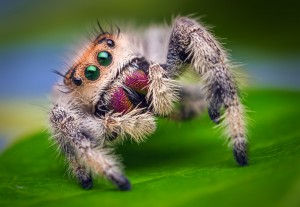14
Aug
Sublethal Exposure to Pesticides Induces Personality Changes in Spiders
(Beyond Pesticides, August 14, 2015) Sublethal exposure to the organophosphate pesticide phosmet results in significant alterations in personality in individual spiders, according to a study published in the July print edition of the journal Functional Ecology.
 The study, titled “Under the influence: sublethal exposure to an insecticide affects personality expression in a jumping spider,” examines whether sublethal exposure to an organophosphate insecticide affects the consistency of individual behavior and disrupt behavioral correlations in the jumping spider Eris militaris (Araneae: Salticidae). Researchers measured the behavior of jumping spider adults by scoring them according to an open-field and a prey-capture assay, each conducted both before and after exposure to the insecticide phosmet. Researchers then measured the changes in repeatability, a measure of the extent of personality differences, and behavioral correlations between exposed and unexposed groups. Although there are no discernible effects on the population’s average behaviors, exposed individuals showed an average of 23 percent lower repeatability and the correlation between activity and prey capture is more strongly collapsed in females.
The study, titled “Under the influence: sublethal exposure to an insecticide affects personality expression in a jumping spider,” examines whether sublethal exposure to an organophosphate insecticide affects the consistency of individual behavior and disrupt behavioral correlations in the jumping spider Eris militaris (Araneae: Salticidae). Researchers measured the behavior of jumping spider adults by scoring them according to an open-field and a prey-capture assay, each conducted both before and after exposure to the insecticide phosmet. Researchers then measured the changes in repeatability, a measure of the extent of personality differences, and behavioral correlations between exposed and unexposed groups. Although there are no discernible effects on the population’s average behaviors, exposed individuals showed an average of 23 percent lower repeatability and the correlation between activity and prey capture is more strongly collapsed in females.
“Bronze jumping spiders play an important role in orchards and fields, especially at the beginning of the agricultural season, by eating many of the pests like the oblique-banded leafroller, a moth that attacks young plants and fruit,” says study author Raphaël Royauté, Ph.D., in a statement. “Farmers spray insecticides on the plants to get rid of these same pests, and it was thought that it had little significant effect on the spiders’ behaviors. But we now know that this isn’t the case.”
“Most individuals have an individual signature in their behaviors, what scientist call “personality types,” says Dr. Royauté. “Some individuals are willing to take risks when predators are present, explore new territories faster, or capture prey more quickly. But the effects of insecticides on personality types remains poorly described.”
The study results suggest that the effects of insecticide exposure are more complex than previously thought. Exposure to low levels of insecticides may not outright kill the organisms, but can alter their behavior in ways that may ultimately affect the performance of an important arthropod predator in agricultural environments. Simply put, researchers found that, in general, the behavior of spiders became increasing unpredictable, and the individuals behaved less according to their personality type after exposure. There was also a difference in behavior according to the sex of the spider. Exposed males were able to continue to capture prey as they had before, but “lost” their personality type when exploring their environment. Individual females, however, were much more affected in their ability to capture prey.
Based on these results, the study calls for “an increasing focus on individual behavioral variation when testing the effects of pesticides on non-targeted fauna.”
“By looking at the way that insecticides affect individual spider behaviors, rather than averaging out the effects on the spider population as a whole, as is traditionally done in scientific research, we are able to see some significant effects that we might have otherwise missed,” said Chris Buddle, Ph.D., in the statement. Dr. Buddle, who co-authored the paper, added, “It means we can measure the effects of insecticides before any effects on the spider population as a whole are detected, and in this case, it’s raising some red flags.”
Phosmet is an organophosphate insecticide used in agriculture, forestry, and residential settings to control fleas, sarcoptic mange live, hornflies, and ticks. It has been found to be neurotoxic and cause kidney/liver damage, and is toxic to birds and bees as well. A 2010 Biological Opinion from the National Marine Fisheries Service (NMFS) found phosmet to be one of 12 organophosphate pesticides to likely jeopardize the continued existence of one or more of the 28 endangered and threatened Pacific salmonids and destroy or adversely modify their designated critical habitat.
To avoid organophosphate and other harmful pesticides in your food, seek out and purchase certified organic products, which never allow toxic synthetic insecticides, and take steps to improve soil and habitat for wildlife such as pollinators. To view which food crops have harmful pesticides used on them, view Beyond Pesticides’ Eating with a Conscience webpage.
All unattributed positions and opinions in this piece are those of Beyond Pesticides.
Source: Nature World News, McGill University
Photo Source: Wikimedia










